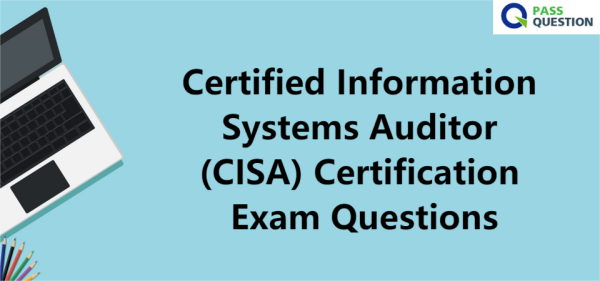Certified Information Systems Auditor (CISA) Certification Exam Questions
How To Become a Certified Information Systems Auditor? The Certified Information Systems Auditor (CISA) is a globally recognized certification designation for audit, assurance and security professionals. PassQuestion new updated Certified Information Systems Auditor (CISA) Certification Exam Questions to help you best prepare for your test and pass your CISA Certification exam successfully. It contains real CISA Certification exam questions and answers that would give you comprehensive and concise information about every topic of CISA Exam. We can guarantee that you can pass the Certified Information Systems Auditor (CISA) Certification exam in the first time.

What is Certified Information Systems Auditor (CISA)?
Validate your expertise and get the leverage you need to move up in your career. With ISACA's Certified Information Systems Auditor (CISA) certification, you can do just that. CISA is world-renowned as the standard of achievement for those who audit, control, monitor and assess an organization’s information technology and business systems.
CISA certification is foundational to a successful IT career. If you are an entry-level to mid-career professional, CISA can showcase your expertise and assert your ability to apply a risk-based approach to planning, executing and reporting on audit engagements. Gain instant credibility in your interactions with internal stakeholders, regulators, external auditors, and customers.
Exam Information
- Exam Name: ISACA Certified Information Systems Auditor (CISA)
- Exam Code: CISA
- Exam Price ISACA Member: $575 (USD)
- Exam Price ISACA Nonmember: $760 (USD)
- Duration: 240 mins
- Number of Questions: 150
- Passing Score: 450/800
Exam Domain
- Information Systems Auditing Process
- Governance and Management of IT
- Information System Acquisition, Development and Implementation
- Information Systems Operations and Business Resilience
- Protection of Information Assets
Benefits of a CISA certification
The CISA certification is recognized worldwide as the sign of an individual's excellence within information system auditing. Benefits of a CISA certification include:
- A competitive advantage in the job market and with job growth.
- Increased value of the individual within the organization.
- Increased credibility in the workplace. This is due to the combination of the achievement of passing the exam and the recognition of work and educational experience.
- Assistance meeting high professional standards with ISACA's requirements and Continuing Professional Education program.
- Confirmation of an individual's knowledge, experience and expertise in the field. Demonstration of their ability to successfully meet challenges that may arise.
View Online ISACA Certified Information Systems Auditor (CISA) Free Questions
1.Which of the following would be to MOST concern when determine if information assets are adequately safequately safeguarded during transport and disposal?
A. Lack of appropriate labelling
B. Lack of recent awareness training.
C. Lack of password protection
D. Lack of appropriate data classification
Answer: D
2.When reviewing an organization's information security policies, an IS auditor should verify that the policies have been defined PRIMARILY on the basis of:
A. a risk management process.
B. an information security framework.
C. past information security incidents.
D. industry best practices.
Answer: B
3.During an ongoing audit, management requests a briefing on the findings to date.
Which of the following is the IS auditor's BEST course of action?
A. Review working papers with the auditee.
B. Request the auditee provide management responses.
C. Request management wait until a final report is ready for discussion.
D. Present observations for discussion only.
Answer: D
4.Which of the following is the BEST recommendation to prevent fraudulent electronic funds transfers by accounts payable employees?
A. Periodic vendor reviews
B. Dual control
C. Independent reconciliation
D. Re-keying of monetary amounts
E. Engage an external security incident response expert for incident handling.
Answer: B
5.The implementation of an IT governance framework requires that the board of directors of an organization:
A. Address technical IT issues.
B. Be informed of all IT initiatives.
C. Have an IT strategy committee.
D. Approve the IT strategy.
Answer: D
6.An organization's enterprise architecture (EA) department decides to change a legacy system's components while maintaining its original functionality.
Which of the following is MOST important for an IS auditor to understand when reviewing this decision?
A. The current business capabilities delivered by the legacy system
B. The proposed network topology to be used by the redesigned system
C. The data flows between the components to be used by the redesigned system
D. The database entity relationships within the legacy system
Answer: A
7.IS management has recently disabled certain referential integrity controls in the database management system (DBMS) software to provide users increased query performance.
Which of the following controls will MOST effectively compensate for the lack of referential integrity?
A. More frequent data backups
B. Periodic table link checks
C. Concurrent access controls
D. Performance monitoring tools
Answer: B
8.Which of the following is MOST useful for determining whether the goals of IT are aligned with the organization's goals?
A. Balanced scorecard
B. Enterprise dashboard
C. Enterprise architecture (EA)
D. Key performance indicators (KPIs)
Answer: B
- TOP 50 Exam Questions
-
Exam
All copyrights reserved 2026 PassQuestion NETWORK CO.,LIMITED. All Rights Reserved.

